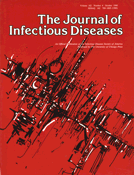-
Views
-
Cite
Cite
Ding-Shinn Chen, George C. Kuo, Juei-Low Sung, Ming-Yang Lai, Jin-Chuan Sheu, Pei-Jer Chen, Pei-Ming Yang, Hsu-Mei Hsu, Mei-Hwei Chang, Chien-Jen Chen, Liang-Cheng Hahn, Qui-Lim Choo, Teh-Hong Wang, Michael Houghton, Hepatitis C Virus Infection in an Area Hyperendemic for Hepatitis B and Chronic Liver Disease: The Taiwan Experience, The Journal of Infectious Diseases, Volume 162, Issue 4, October 1990, Pages 817–822, https://doi.org/10.1093/infdis/162.4.817
Close - Share Icon Share
Abstract
To assess the contribution of hepatitis C virus (HCV) in liver disease in Taiwan, antibody to HCV (anti-HCV) was studied by radioimmunoassay in 392 patients with chronic liver disease and in 440 healthy adults and 444 subjects at risk. The anti-HCV prevalence was 0.95% in 420 volunteer blood donors, 90% in 100 hemophiliacs, and 81% in 58 parenteral drug abusers. AntiHCV was present in 6 (7.7%) of 78 hepatitis B surface antigen (HBsAg)-positive and 28 (65%) of 43 HBsAg-negative patients with chronic hepatitis, 3 (10%) of 31 HBsAg-positive and 13 (43%) of 30 HBsAg-negative cirrhotics, and 7 (17%) of 42 HBsAg-positive and 15 (63%) of24 HBsAgnegative patients with hepatocellular carcinoma (HCC). An outbreak of non-A, non-B hepatitis revealed 18% of 57 patients to bepositive for anti-HCV, and in 29 patients with posttransfusion hepatitis prospectively followed, 7 (24%) developed anti-HCV. Thus, HCV infection appears to playa relatively minor role in HBsAg-positive liver disease in Taiwan but is strongly associated with HBsAg-negative chronic liver disease and HCC. The infection is extremely common in hemophiliacs and parenteral drug abusers.






